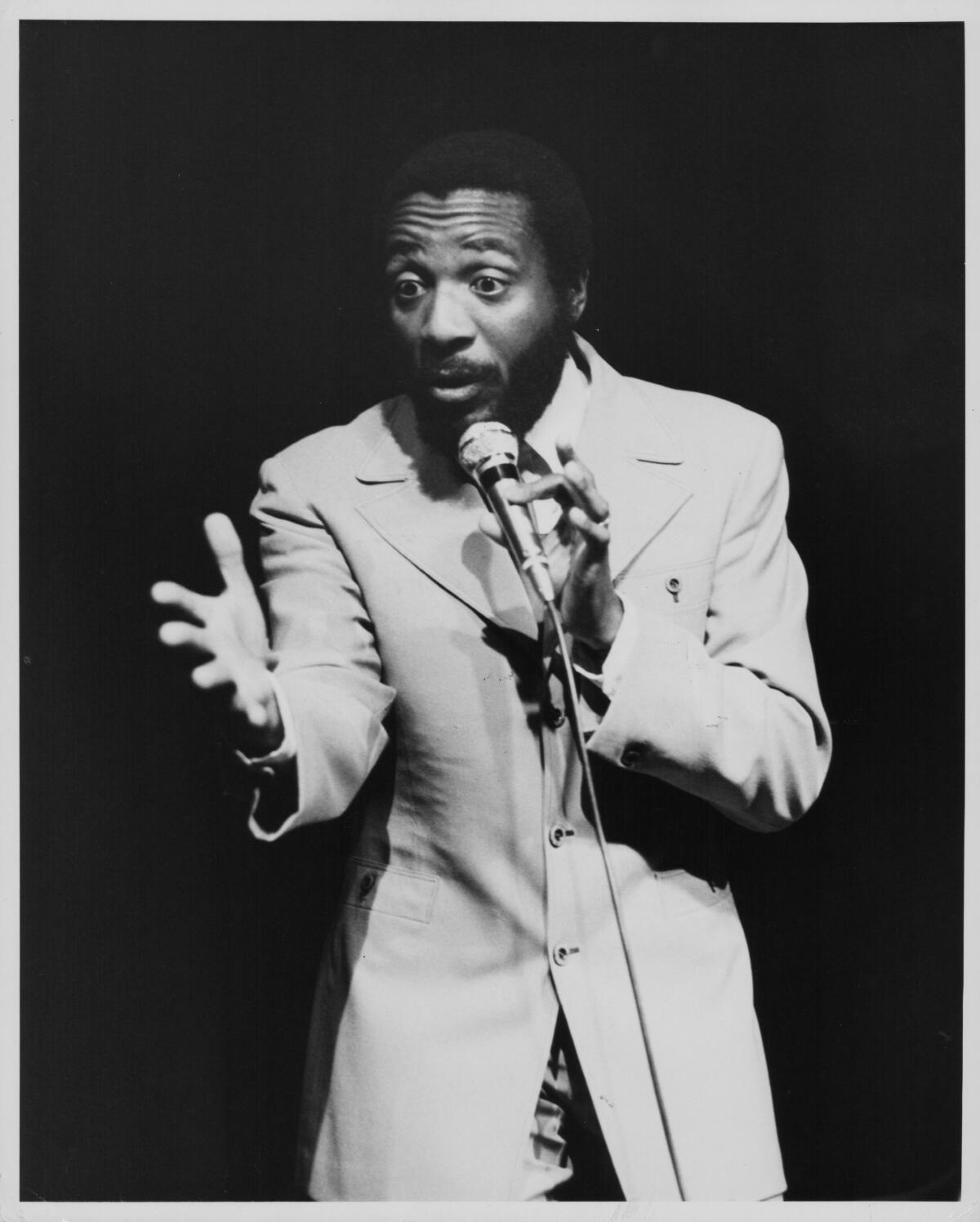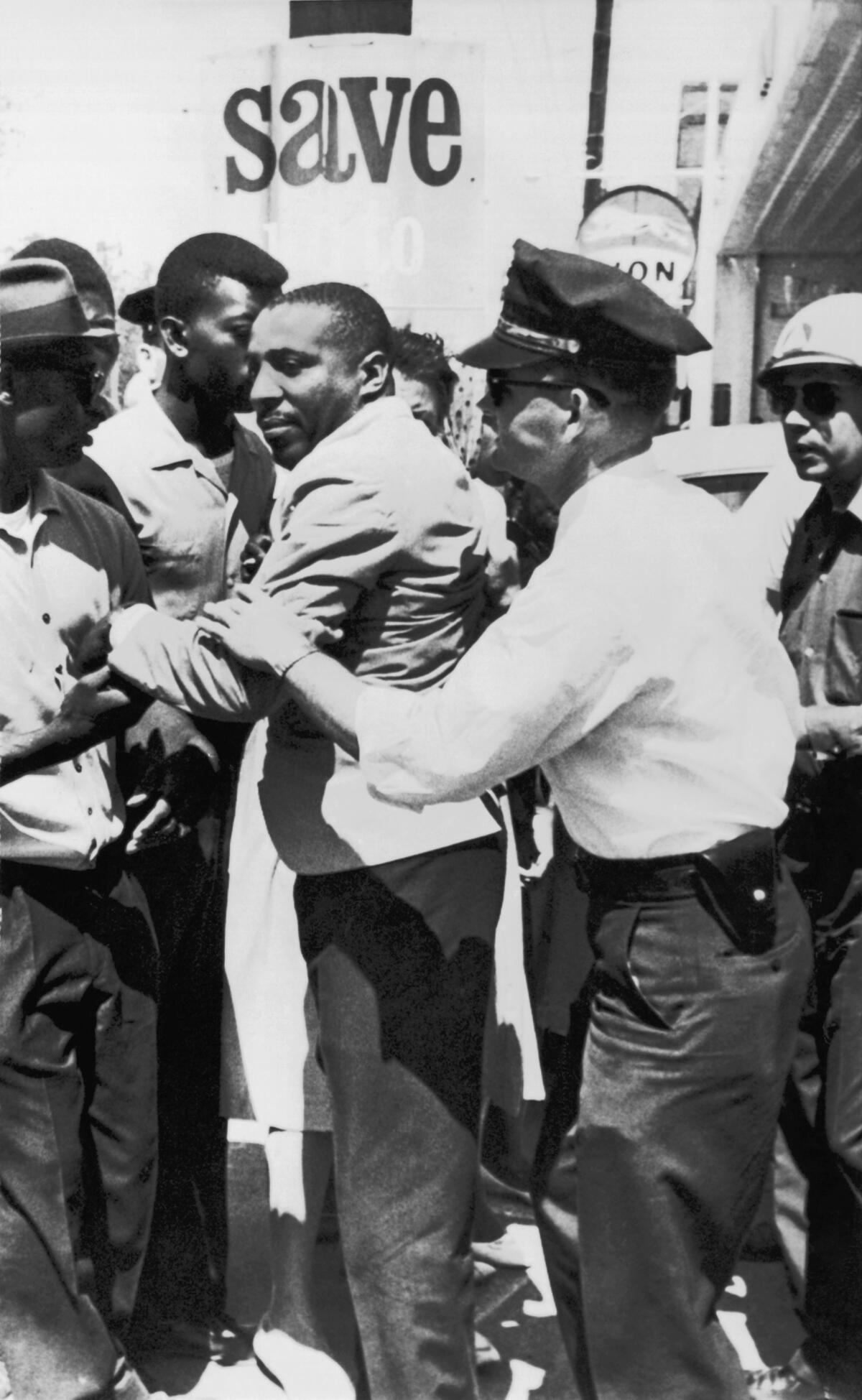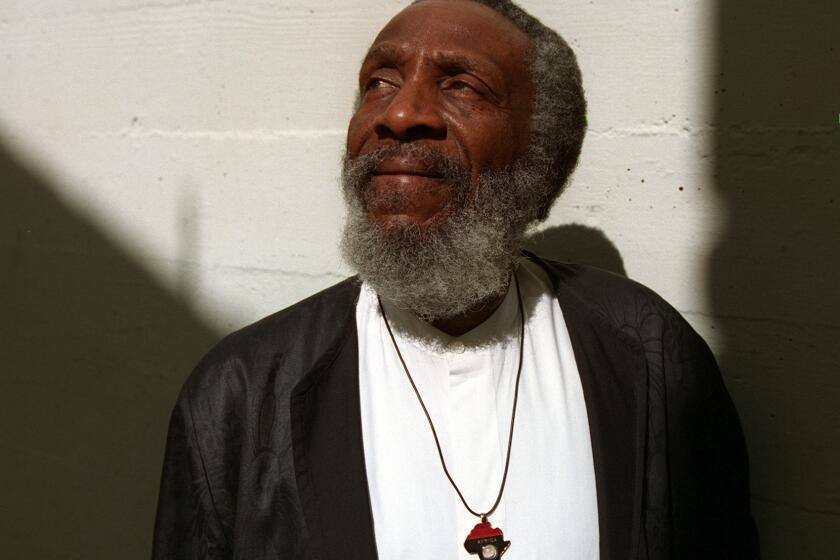Dick Gregory was one of America’s top comics. He gave it up to do what was right
- Share via
Dick Gregory, depending on when one joins or leaves his story, may be remembered as a stand-up comic, someone who used to be a comic, or someone who used to be a comic who became one again; a person who went on long fasts to make political points, a dedicated activist, a nutritional pitchman and mogul, or a prickly elder statesman, a guest on all manner of talk shows, radio programs, podcasts and panels. For some, the name will ring no bells at all.
But whatever one knows or doesn’t know about him, Andre Gaines’ documentary “The One and Only Dick Gregory,” premiering Sunday on Showtime, should prove an enlightening and ultimately deeply moving experience — the story of a man not easy to categorize, for whom the condition and future of his people, and of all people, meant more than his own comfort, fortune and, at times, family. (He was away a lot, saving the world.) It is as good or better a way to celebrate the Fourth of July than anything else you may have planned.
“I think people get confused and think that he was an activist who decided to be funny,” says W. Kamau Bell, one of several Black comedians interviewed here, including Wanda Sykes, Chris Rock, Kevin Hart, Lena Waithe and Dave Chappelle. “No, no, no — his soul was that of a stand-up comic, he could not just do that in a world that was falling down around him.”
Comedian and activist Dick Gregory died Saturday at 84.
With Bill Cosby in the news again — even without that — it’s hard not to compare the two comedians, who came up roughly at the same time, Cosby’s own career-making “Tonight Show” appearance following Gregory’s 1961 debut by two years. Both came from poor backgrounds, both were star athletes; both left college for comedy, both broke color lines and brought new notes to comedy.
Their approaches were different: Gregory, who worked off the news (like Mort Sahl, with whom he would tour in 2009), told compact jokes that were expressly political, from the point of view of a Black person in a racist society; Cosby told elaborate stories from his life that, in their universal appeal, offered white audiences another sort of glimpse into the Black experience. And each grew cantankerous in his later years. Gregory had a penchant for conspiracy theories — not unreasonable for a man the FBI actively sought to “neutralize” and who lost friends to assassination: Medgar Evers, the Rev. Martin Luther King Jr., Malcolm X. But one became a superstar, who would be accused of abusing his power, while the other gave everything away in pursuit of righteousness.
Gregory’s break came when he was booked as a substitute one night at the Playboy Club and, facing a room filled with Southerners in town for a convention, converted them to his side with jokes about segregation and the Klan. (He liked football, he said, because it was “the only sport a Negro can chase a white man and 40,000 people stand up and cheer him.”)
The substitute gig turned into several weeks’ booking, and then into a feature in Time magazine. When he turned down a booking on Jack Paar’s “The Tonight Show” (no less powerful a cultural institution than Johnny Carson’s would be) because Black performers were never invited over to the couch, Paar called him to promise that he would be. That raised his rates exponentially, and led to bookings across the spectrum of talk and variety shows. In many ways, he was what the times required, the voice white America needed as much as Black.

In the fall of 1962, accepting an invitation from civil rights activist Evers, he went down to Jackson, Miss., to speak at voter registration rallies and in a sense never went back. He canceled a fortune in bookings in order to stay on the front lines, leveraging — some would say squandering — his celebrity to get press for the cause. To his wife, Lillian, with whom he would have 11 children (one died in infancy), he extracted a promise that “if anything happened to me, if I got killed, that she would never raise those kids with hate. I would feel I had died in vain if my kids turned out haters.”
He was arrested more than 100 times. In a Southern jail he was beaten so badly that the swelling “tore my suit right off.” In 1965, trying to broker peace in Watts, he was shot in the leg. Civil disturbances, he said, represented “not only the problem of the negro but the problem of the poor white man. … It’s not a Los Angeles problem, it’s not a Mississippi problem, it’s an American problem.”
Dick Gregory, who became the first black stand-up comic to break the color barrier in major nightclubs in the early 1960s, a decade in which he satirized segregation and race relations in his act and launched his lifetime commitment to civil rights and other social justice issues, died Saturday.
As the decade progressed, he lent his time to other causes, and a fast in protest against the Vietnam War — “This is my 14th month of not eating any solid food to protest the war in Vietnam and the reason I mention that now is because I’m hungry” — led him to add a new tactic to his repertoire and a new mission to his catalog. He became an advocate for health and nutrition, which he also saw as a Black issue. He lost a person’s worth of weight, taking on a bearded-prophet look he wore almost as a brand.
Fasting became a kind of art with him: “What’ll happen is people will ask you why aren’t you eating, and once they ask you you now get to explain to them what the issue’s about.” And he ran — once from New York to Los Angeles — 50 miles a day to draw attention to world hunger, eating no solid food but only his own nutritional supplement, later marketed as Dick Gregory‘s Bahamian Diet.

Eventually, Gregory would return to the stage in a more discursive sort of act, in which the jokes were worked into the lecture. He would be onstage for hours, an assistant recalls, and spend an hour afterward talking with fans. That he liked to talk is a recurring observation here. He worked nearly up until the day he died, in 2017, at 84.
Even at feature length, “The One and Only Dick Gregory” offers only a portion of a life and career, but like all good biographies it may drive the viewer toward further research; fortunately, it is easy to find clips of Gregory young and old online, including an interesting 1967 independent film “Sweet Love, Bitter” (unmentioned here) in which he plays a jazz musician based on Charlie Parker (with touches of Thelonious Monk in the performance). What Gaines does not miss is Gregory’s spirit, and its effect — amusing, bemusing, inspiring — on the world around him.
“The sacrifices he made aren’t necessarily required of every artist,” Chappelle says toward the film’s end. “But there are very special people every few generations are blessed with [who] are willing to do that. And when you see these people, you should give them your love and your respect, protect them to whatever extent you can, and try to recognize that they’re doing something very difficult for the benefit of all of us.”
‘The One and Only Dick Gregory’
Where: Showtime
When: 9 p.m. Sunday
More to Read
The complete guide to home viewing
Get Screen Gab for everything about the TV shows and streaming movies everyone’s talking about.
You may occasionally receive promotional content from the Los Angeles Times.








